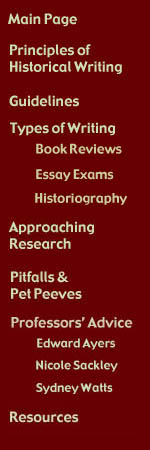

Interview with President Edward Ayers, Ph.D.

It is no surprise that college writing differs from writing in high school, but many students who take history courses find that writing for history is difficult. University of Richmond President and Professor of History Dr. Edward Ayers is both a respected historian and a professor who teaches history in the classroom. He also works with University of Richmond's Digital Scholarship Lab to explain history in new ways with modern technology. Here he provides some helpful ideas for how to improve history papers:
- Let the reader know why your topic is important
- Write in your own voice; don't try to sound like a professor
- Always be accurate when quoting sources
- Ask yourself "What do I have to add to this particular historical debate?"
- Use your imagination
If you keep these things in mind while writing a history essay, they will help you to convey your argument clearly and to add your own thoughts to historical debates. Here are interviews with Dr. Edward Ayers that help to explain how to write well for history, tips for beginning writers studying history, how to think like a historian, what historiography is, how to write good historiography, and what to think about when creating a historical multimedia project. Key points from each interview follow the video.
Writing for History
Key Points:
"The main thing that makes history, history, is that it can have any form, but it has to be true to an authenticated documentary record."
- Accuracy to a historical record is essential
- Everything that you argue must be accountable to a piece of evidence that is an authenticated documentary record
"History writing has to have a point."
- Let the reader know why your topic is interesting and important
- Ask yourself: "Why am I writing about this?"
Tips for Beginning Students
Key Points:
"Write what you want to write, and write it as well as you can."
- Write in your own voice; don't try to sound like a professor
- Ask yourself: "What about this touches me?"
- Try to covey the topic's "full human capacity" to the reader
Thinking like a Historian
Key Points:
"Thinking about history like a historian is thinking about context, and thinking in time."
- Try to see both the sequence of time and the "circle" of context together in order to have the right approach for thinking about history
Historiography
Key Points:
"Historiography is the history of history, the history of writing about history."
- Historians write in their own time, so each historian's environment impacts his or her work
- Historiography can be a way to gain self-knowledge and self-perception
- Ask yourself: "Why do we think this subject was important in this way at this time?"
- Ask yourself: "What do I have to add?"
"Patience is the best way to write as efficiently as possible."
- Read your primary and secondary materials carefully
- Analyze the subject before you start writing
- Don't take another historian's quotation out of context
- Taking notes on a notepad while reading is helpful to organize your ideas and emphasize the most important information you have read
Historical Multimedia Projects
Key Points:
"My advice would be to actually think about media as a form of film criticism or analyzing a complex object."
- Multimedia projects are challenging, but don't be scared of them
- Look at examples from art history and film history to help you
"History is the record of everything that happened before today, and it can be told in any way."
- History can take any form, not just books
"Use your imagination."
- Ask yourself: "How can I touch this time of the past?" Try to find a new approach to your topic
- Try to look at history in fresh ways
Other Disciplines | Writer's Web | Writing Center | Make an Appointment
| Library | History Department
Copyright Info